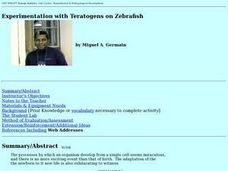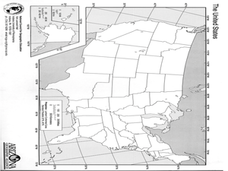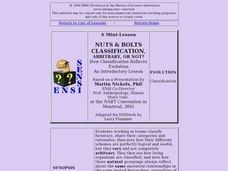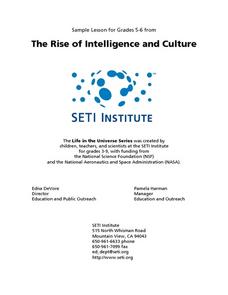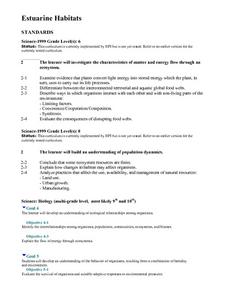Curated OER
Case of the Threespine Stickleback
Students examine why some freshwater populations of stickleback fish. In this macroevolution instructional activity students read a study packet then answer questions.
Curated OER
Experimentation with Teratogens on Zebrafish
High schoolers compare mitosis and meiosis with regard to chromosome number in parent cells versus daughter cells, types of cells produced, total number of cells produced, and the number of divisions. In groups, identify and...
Curated OER
Exploring the Interstellar Medium
Students investigate the Interstellar Medium and the Local Bubble that the Sun is inside. They read and discuss a handout, answer discussion questions, observe a demonstration of light scattering, and conduct an experiment on the...
Curated OER
Dinosaur Paleoecology: Determining the Diet of Ancient Animals
Students study dinosaur teeth and bones to determine the creatures diet, size and shape.
Curated OER
Communication Overload
Pupils take a trip through time to find out how language, and other ways of communicating, have evolved. They see how the specific technologies of e-mail and spam work and discover the most modern methods of blocking unwanted messages.
Project SMART
Exploring the History of Mathematics
Students research six different mathematicians using Internet resources. They examine the contributions of different cultures, women, and one that made a significant to geometry. They present their research to the class.
Curated OER
Route 66 And Population Patterns
Learners investigate the geography located along Route 66. They research how the population patterns change in certain areas along the highway. Students use the information in order to form hypotheses about how and why the population...
Curated OER
Spider Activities, Experiments and Projects
Students examine seven spiders and put them into two or three groups based on their structural similarities. In groups, they create a cladogram proposing possible ancestral relationships. Students design an experiment related to their...
Curated OER
Can You Beat Jet Lag?
Learners examine the health condition of jet lag. Using mealworms, they test the effect of light on the development of them into adults. They answer discussion questions and examine the relationship of age and one's activity level.
Curated OER
Comparing Two Turtles
Students compare and contrast the various observable features of two different turtles. in groups, they complete a visual analysis of the sea turtle and tortoise. Using their observations, they complete Venn Diagram of the observable...
Curated OER
Build-A-Bird
Students create an imaginary bird. In this anatomy lesson, students analyze how artists represent birds historically, then determine the anatomical aspects that suit a bird to its habitat. Using this information, students create an...
Curated OER
Where Are the Dinosaurs?
Students create a dinosaur egg with balloons and newspaper. In this earth science lesson plan, students explore the extinction of dinosaurs. Students view a web clip and relate it to the extinction of animals they have never seen.
Curated OER
Let's Take a Rock Apart
Students take a crushed rock and sort the remains of the rock minerals into different categories based on the different properties. In this sorting lesson plan, students learn what makes up a rock and how to sort something into categories.
Curated OER
Science and Politics in the Soviet Union
In this Soviet Union worksheet, students read a 2-page selection about scientific work in the country and then respond to 4 short answer questions based on the selection.
Curated OER
Sounds of the Wetlands
Students identify the sounds of different bird calls. In this biology lesson, students create a sound map. They explain how this method is important in tracking wildlife.
Curated OER
Contrivances: Orchids and the Panda's Thumb
Middle schoolers read and discuss selected and edited excerpts from the essays of Stephen Jay Gould on the subject of contrivances.
Curated OER
Cladistics Is a Zip...Baggie
Students explore how the grouping of organisms based on their shared derived characters forms the basis of a cladogram.
Curated OER
Nuts & Bolts: is Classification, Arbitrary, Or Not?
Students, in groups, classify furniture, share their categories and rationales, then note how their different schemes vary, perfectly logical and useful, but completely arbitrary.
Curated OER
Invertebrates
Students identify insect body parts and look for local insect life. They create an insect using recycled material and design a classroom mural with bug facts. They study Monarch butterflies and dragonflies.
Curated OER
Adventuring in the Archipelago
Students study Charles Darwin's voyage on the HMS Beagle and his visit to the Gal??pagos Islands. They click through an interactive map of the Gal??pagos Islands to read actual and fictional journal entries from a fellow eco-tourist.
Curated OER
What's Living in My Mouth?
Young scholars articulate in written and oral formats that bacteria can be found living everywhere. They explain in written and oral formats why the immune system is necessary. Students are presented with an opportunity to see bacteria...
Curated OER
Extraterrestrial Communication: Can We Talk to Anybody Out There?
Students examine the possibilities of communication with other living organisms within our solar system through research and hands on activities, as well as observing and analyzing teacher demonstrations.
Curated OER
Estuarine Habitats
Sixth graders study the important habitats, flora, fauna, and physical factors of coastal habitats. They compare the aquatic habitats to terrestrial habitats by researching and completing tables with the information.
Curated OER
FLY HIGH!!!
Students create their own bird study in their own schoolyard using the scientific method (see Testing a Hypothesis in Join the Project). Students do research in the library, at a local college, or on the Internet to determine the...



